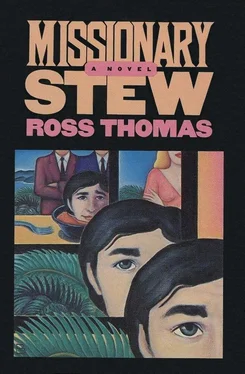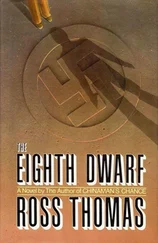Ross Thomas - Missionary Stew
Здесь есть возможность читать онлайн «Ross Thomas - Missionary Stew» весь текст электронной книги совершенно бесплатно (целиком полную версию без сокращений). В некоторых случаях можно слушать аудио, скачать через торрент в формате fb2 и присутствует краткое содержание. Город: New York, Год выпуска: 1983, ISBN: 1983, Издательство: Simon & Schuster, Жанр: Политический детектив, на английском языке. Описание произведения, (предисловие) а так же отзывы посетителей доступны на портале библиотеки ЛибКат.
- Название:Missionary Stew
- Автор:
- Издательство:Simon & Schuster
- Жанр:
- Год:1983
- Город:New York
- ISBN:978-0-671-49363-9
- Рейтинг книги:3 / 5. Голосов: 1
-
Избранное:Добавить в избранное
- Отзывы:
-
Ваша оценка:
- 60
- 1
- 2
- 3
- 4
- 5
Missionary Stew: краткое содержание, описание и аннотация
Предлагаем к чтению аннотацию, описание, краткое содержание или предисловие (зависит от того, что написал сам автор книги «Missionary Stew»). Если вы не нашли необходимую информацию о книге — напишите в комментариях, мы постараемся отыскать её.
Missionary Stew — читать онлайн бесплатно полную книгу (весь текст) целиком
Ниже представлен текст книги, разбитый по страницам. Система сохранения места последней прочитанной страницы, позволяет с удобством читать онлайн бесплатно книгу «Missionary Stew», без необходимости каждый раз заново искать на чём Вы остановились. Поставьте закладку, и сможете в любой момент перейти на страницу, на которой закончили чтение.
Интервал:
Закладка:
After Haere picked up the phone and said hello, the governor-elect said, “Well?”
“She doesn’t think he should run.”
“Really?”
“Really.”
There was a pause. “Is she as bright as they say she is?”
“Brighter.”
Another pause. “Well, that’s one down.”
“And a half-dozen or so to go,” Haere said.
“Replogle will meet you in the lobby at nine tomorrow,” Veatch said. “He wants to go up to his lodge in Breckenridge.”
“Okay. How’d he sound?”
“Like a man dying of cancer, and cancer of the prostate at that, which is not exactly the most pleasant way to go.”
“He still thinks that what he has is... interesting?” Haere said, choosing his ambiguous words carefully.
“He thinks it’ll blow them out of the water in ’eighty-four,” Veatch said.
Draper Haere sighed. Despite repeated efforts, he had never been able to convince Baldwin Veatch that the telephone was not a private means of communication. Veatch loved to call people, all sorts of people, and offer praise, encouragement, and chatty, surprisingly sensible advice. Just before the fall campaign began in earnest, he and Haere had spent the Labor Day weekend up in Veatch’s summer shack in French Gulch. Among those Veatch had called and talked to (if briefly) had been Schmidt of Germany, de la Madrid of Mexico, Hussein of Jordan, and Rose of Philadelphia, who was in a slump.
“Baldy,” Haere said, “you know something?”
“What?”
“You talk too much,” Haere said and hung up. He turned to his bag, took out a bottle of Scotch, poured some into a glass, added water from the bathroom tap, crossed to the window, and gazed out across Broadway at the tall bank building, which now stood on the site of the long-demolished Shirley-Savoy Hotel, an old pols’ hotel in whose rooms Haere recalled more than a few sexual and political adventures. For some reason, sex and politics for Haere had always gone hand in hand.
Deciding he didn’t really need or want any old memories that night, Haere finished his drink, brushed his teeth, and got into bed with his illicit bedtime reading, which had been flown to him in New York by Purolator Courier from Sacramento.
It was a special bootleg copy, fresh off the Xerox machine, of a precinct-by-precinct breakdown of the voting in California during the just-over election. It was also nothing but a long, long list of names and figures, although to Draper Haere it was a wonderful tale of glorious victory and ignoble defeat, which he read avidly until he fell asleep just before he reached Ventura County.
Draper Haere awoke at 6:30 the next morning, which was when he always awoke regardless of jet lag and changing time zones. At forty-two, Haere was a deceptive-looking man who wore a martyr’s face atop a natural athlete’s body. The face he found useful, but the body had gone largely unexploited because Haere had long since decided that all vigorous physical activity, other than sex, was by and large a waste of time. It had been at least twenty years since he had last shot a gun, mowed a lawn, washed a car, painted a wall, caught a fish, or hit a ball of any kind. However, Haere did walk, often as much as seven or eight miles a day. He walked because it was a sensible way to get somewhere, because it gave him time to think, and because he was one of life’s great gawkers.
The sad brown eyes, the weary mouth, the delicate nose, and the sturdy chin had somehow melded themselves into a long-suffering look that many mistook for past tragedy, but that was actually chronic exasperation. Because of his almost saintly looks, Haere was the first person trusting strangers turned to with their tales of despair and their questions about how to get to Disneyland. Haere could have been a world-class confidence man. He had instead gone into politics on the nuts-and-bolts side, and nearly everyone agreed that he was the best there was at his particular specialty, which was writing letters to people and getting money back in the mail.
After Haere awoke he noticed that it seemed strangely quiet until he looked out the window and discovered it had snowed during the night — not much, perhaps five or six inches, which was hardly anything in Denver because the sun usually came out and melted it by midafternoon. In New York, Haere knew it would have created chaos;in Washington, panic; and in Los Angeles, well, in Los Angeles five inches of snow on the freeways could only have signaled Armageddon. In Denver they didn’t even bother to put on the chains.
Haere, still wearing the Jockey shorts he had slept in, got out the three-cup pot and the instant Yuban. The pot boiled three cups of water in less than sixty seconds and Haere had bought it at Marshall Field’s in Chicago five years before after paying, for the first time, $12 plus tip for two cups of room-service coffee in the Ritz-Carlton. Although he realized that of such small economies are crotchety bachelors made, the pot now went with him everywhere. He also brought along his own mug, spoon, and sugar.
After the coffee, the three cigarettes, the shave, and the shower, Haere dressed in what he always dressed in, a blue three-piece pinstripe suit, and took the elevator down to the lobby, checked out, turned, and got his first shock of the day, which was a three-quarter profile of Jack Replogle as he stood in the lobby and did what everyone does in the Brown Palace — gaze up at the splendid hollow core around which the hotel is built.
Replogle had lost weight — at least twenty or thirty pounds. He seemed to huddle down in his Antartex coat. For a moment it also seemed as though he had lost two or three inches in height, which would have brought him down to Haere’s own five eleven and a half. Haere then realized that Replogle was bent over, angled down and to one side, and apparently couldn’t look up by throwing his head back, but only by twisting it around on his neck.
Replogle’s deep-set green eyes had burrowed even farther back into his head, and under them were twin dark smears. His skin seemed to have the color and texture of newsprint. He was an obviously sick man, so Haere went up to him and tapped him on the shoulder. When Replogle turned, Haere said, “You look like hell.”
Although the pain had etched itself across his face, Haere saw that Replogle’s smile was still the same — the smile of a man who has long known some very funny secret he has finally decided to divulge to you and none other.
Replogle looked Haere up and down carefully, nodded as if satisfied, or at least reassured, and said, still smiling, “I don’t need your fucking sympathy.”
“Hurts, huh?”
“Yeah, it hurts. Let’s go.”
Replogle turned and started toward the west entrance of the hotel. Haere followed with his bag through the door and out into the street, where a Jeep station wagon was parked at the curb. Haere saw it was the four-wheel-drive kind, which he thought was called the Wagoneer.
Replogle got behind the wheel and fastened his seat belt. Haere didn’t. He never did. And then Replogle did what he had always done whenever Haere had ridden with him — and this went back more than thirty years to when Haere had been only a child. Using one hand, his right, Replogle slowly pulled an imaginary pair of World War II flying goggles down over his eyes. Even after thirty years it still got a smile out of Haere.
Jack Replogle had been a hot navy pilot in that long-ago war. After it was over Haere’s father and Replogle discovered they had once been only a thousand feet or so apart on a small island in the Philippines: Replogle up in the air in his Hellcat, Haere’s old man down on the ground: both of them shooting at each other; Replogle by mistake, Haere’s old man on purpose. Jack Replogle later swore that the infantry rifle fire had actually hit his plane that day. It was a charming lie and he told it often and Haere’s old man always pretended to believe it, but it was still a lie, because, as the senior Haere later told his son, everyone in Company D had been an absolutely rotten shot. Haere was six years old when his father had finally come back from the war in 1946, and he remembered it was years after that before the overage former private first class had stopped referring to it as the fuckininfantry, not two words, but one, virtually inseparable.The morning traffic was heavy, but Replogle drove quickly, expertly, apparently oblivious to the snow that was already turning to slush. They headed south and then turned west at Sixth Avenue, which would lead them onto Highway 6, which eventually turned into Interstate 70. The sun had come out and there was no smog. Ahead, there were the glittering mountains to admire.
Читать дальшеИнтервал:
Закладка:
Похожие книги на «Missionary Stew»
Представляем Вашему вниманию похожие книги на «Missionary Stew» списком для выбора. Мы отобрали схожую по названию и смыслу литературу в надежде предоставить читателям больше вариантов отыскать новые, интересные, ещё непрочитанные произведения.
Обсуждение, отзывы о книге «Missionary Stew» и просто собственные мнения читателей. Оставьте ваши комментарии, напишите, что Вы думаете о произведении, его смысле или главных героях. Укажите что конкретно понравилось, а что нет, и почему Вы так считаете.












